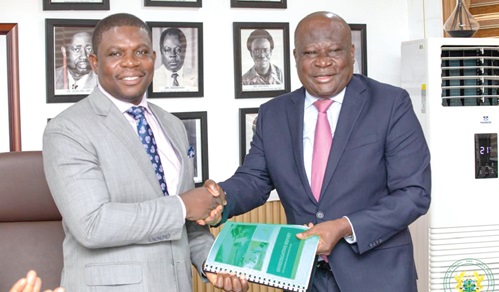The committee that investigated the 2023 Akosombo Dam spillage has recommended adequate compensation for the communities affected by the upstream and downstream floods.
In all, 177 communities, making up 39,170 people in North Tongu, Central Tongu and South Tongu, Shai Osudoku, Asuogyaman, Anloga, Ada East and Lower Manya, were affected, with Mepe in North Tongu being the most impacted.
According to the committee, the decision by the Volta River Authority (VRA) to spill the excess water was necessary, but needed a more effective control spillage flood plan to minimise the impact downstream, a fresh report from the technical team has revealed.
The Chairman of the committee, Kirk Koffi, made this known when he presented the report to Richard Gyan-Mensah, the Deputy Minister of Energy and Green Transition in Accra last Wednesday.
The committee recommended a transparent compensation process, including the establishment of district-level accounts managed by the Ministry of Finance, local Members of Parliament (MPs) and assemblies, adding that verification of claims should involve traditional leaders and local opinion leaders.
“Compensation is a critical issue for affected communities, especially farmers, fishers and business owners who have lost livelihoods,” the report emphasised.
It called for a comprehensive audit of damages and the timely disbursement of funds as budgeted in the 2025 national budget.
The report is part of broader efforts to respond to the 2023 dam spillage, which displaced thousands and caused widespread destruction in parts of the Volta, Eastern and Greater Accra regions.
Committee membership
The committee was inaugurated on March 13, 2025, and was given a timeline of two months to complete its investigations and submit a report by May 2025.
Other members of the committee were Kwame Jantuah, Kofi Ellis, Kwaku Sarpong Akosa and Georgette Emefa Fugah, who was the committee’s secretary.
The committee, in its recommendations, said a designated floodplain should be delineated to accommodate spill discharges in the short to medium term in response to climate change uncertainties and in the long term.
Furthermore, the committee said resilience improvement projects should consider critical public infrastructure upgrades located in the floodplain, including the Sogakope bridge and hospitals.
It stated that there was the urgent need for the enactment of a Legislative Instrument for the downstream floodplain (contour line) to prevent inhabitants from settling or building in those areas.
Mr Koffi said the committee identified a lack of localised emergency preparedness as a major gap in district-level disaster response, and called for the simplification of the Volta River Authority’s Emergency Preparedness Plan into infographics and local languages to enhance community understanding and action.
To address the high turnover of political appointees and coordination gaps, the report recommended the formation of a multi-stakeholder disaster task force involving MPs, Municipal and District Chief Executives (MCEs/DCEs), and traditional authorities, supported by regular public accountability reporting.
The committee further highlighted the importance of engineering solutions, such as improving river channels and vegetative buffer zones with mangroves downstream and bamboo plantations upstream, to increase water conveyance and reduce inundation.
Mr Koffi said the committee proposed the development of multi-purpose safe havens on elevated land that could double as schools or community centres and be converted into shelters during emergencies.
These, the report said, should be complemented by psychosocial support services and feedback mechanisms to capture community experiences.
Mr Gyan-Mensah, who received the report on behalf of the Minister of Energy and Green Transition, John Jinapor, thanked the team for their comprehensive work and said the government would take the necessary steps to implement the recommendations.
“This report is crucial in our efforts to address the impact of the dam spillage.
We are determined to turn these recommendations into actionable solutions that prioritise the well-being of our citizens,” he said.

